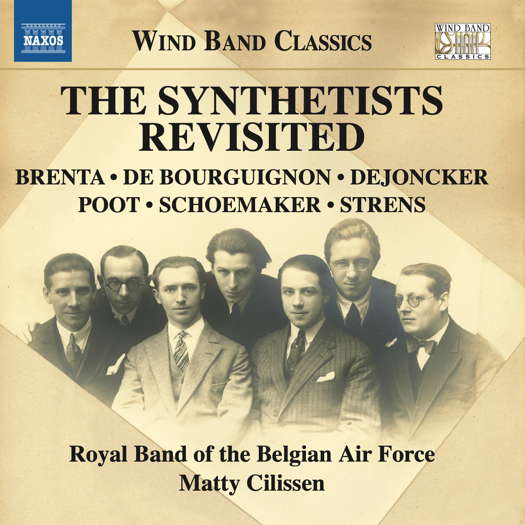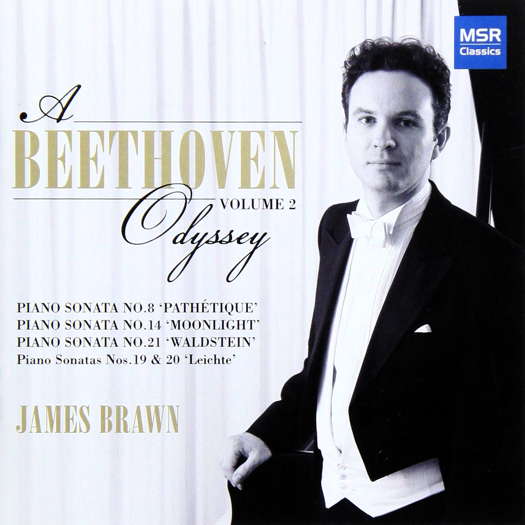- Wergo
- Nepal
- Orlando de Lassus
- Benedetto Marcello
- Orpheus Sinfonia
- Johann Strauss I
- Fyador Chaliapin
- George Dannatt

Lovable Rogues?
PAUL SARCICH delves into the output of the Belgian equivalent of 'Les Six'
'These largely unknown composers have been brought back to life by excellent preparation and performance ...'
This really is a lost corner of music history. In 1925, seven young Belgian composers formed a collective, wanting to break away from the prevailing late romanticism of the time and incorporate modernistic tendencies into their music. Sound familiar? The comparison with Les Six in Paris is obvious, and the Belgians even had a Nadia Boulanger equivalent - Paul Gilson, their teacher at the Brussels Conservatory. Where they differed from the Parisian group was in having no professional orchestras in Brussels, save at the opera. They did have the support though of Arthur Prevost, who directed the Royal Band of the Guides, then and now a top wind orchestra. Eventually some seventy-five works were transcribed or written for wind band, but few were ever published, so most lay forgotten. It took the work of the producer this album, Luc Vertommen, to find and prepare some of them for recording.
The band here is the Royal Band of the Belgian Air Force, directed by Matty Cilissen, and a very fine band it is. Their sound is rich and refined, partly due to having a decent sized clarinet section, not something all bands have these days. With excellent intonation and ensemble, this is a truly symphonic band. A well-balanced recording from Vertommen and engineer/editor Jelle Tassyns allows us to hear all sections clearly.
The major works appearing on this disc are all programmatic, not totally free of romantic ideas, but certainly sounding like early twentieth century works, not late nineteenth. All but two feature adventurers from literature getting up to all kinds of hijinks, the first being Gil Blas, a Spanish character from the works of Lesage, whose adventures are set in theme and variations form by Jules Strens. Gil seems to be one of these lovable rogues who gets away with anything - born a poor groomsman, he has to deal with bandits, jail, helping a doctor poison all his patients, before ending up the King's favourite and finishing up very wealthy.
The music is infused with Spanish folklore, and opens with attractive, colourful music featuring expressive work from solo oboe and alto sax. Inventive character music follows Gil to university, more dramatic music to prison (this is a very busy movement but the band is up to it), more impressionistic and dramatic stuff as he gets out of prison and helps the doctor, and a furiously busy finale that demands much of the band, but they pull it off in style
.Listen — Jules Strens: Finale: Allegro gaio (Gil Blas, Symphonic Variations)
(8.579135 track 6, 4:16-5:15) ℗ 2023 Naxos Rights (Europe) Ltd :
It's all good fun a la Peer Gynt or Til Eulenspiegel, as are most of the 'heros' on this disc. Subtitled 'Humorous Suite', Marcel Poot's Tartarin de Tarascon is based on Daudet, and tells of Tartarin's (mis)adventures in North Africa, including falling in love with a beautiful girl, lion hunting, and of course a happy ending. Some mock Arabic fanfares introduce some jolly music to start the adventure, with a lyrical theme for our hero.
Listen — Marcel Poot: Le Départ (Tartarin de Tarascon)
(8.579135 track 7, 0:00-0:59) ℗ 2023 Naxos Rights (Europe) Ltd :
Some definite tongue-in-cheekness as we go to Algiers, where a flâneur might be strolling the pavements of Paris - more than a hint of Les Six here - rather than a north African city. The Oriental Dance for the beautiful Baïa is actually not hugely oriental, sounding more like French opera-ballet music, apart from a bit of oboe in the Samson et Dalila mould. Tartarin's return keeps up the high spirits and tongue-in-cheek nature with clever mixing of previous tunes. Poot liked the band - he wrote some thirty-four works for it - and it shows in his clever handling of it.
Francis de Bourguignon had the distinction of being Nellie Melba's accompanist, after his solo career as a piano virtuoso was scuppered by a war injury. Returning later to composition, his Récitatif et Ronde shows a spare neoclassicism (reminiscent of Hindemith) with a modernistic lyricism, not overly dissonant though. The Rondo has a chirpy main theme, alternating with passages of calmer music. Michaël Tambour makes a sensitive soloist, straight-toned and very clean in execution. Quite easy on the ear for us now, this piece must have sounded a lot spikier in its day. It could be pushed harder perhaps, but that also might ruin it.
Listen — Francis de Bourguignon: Récitatif et Ronde
(8.579135 track 11, 3:27-4:21) ℗ 2023 Naxos Rights (Europe) Ltd :
Another exotic adventure from Gaston Brenta: his Zo'har, Choreographic Fantasy is based on a Mendès novel, and is full of high drama - monsters rising in the palace of Zo'har, a king and crowds trying to quell them, flaming lava, storms, and the whole lot crushed by a downpour of sulphur. Can't get much more lurid than that. This fourteen and a half minute piece follows it all, from the calm opening of an azure sky, through rapidly changing sections, sometimes fast and active, sometimes slow; with solos sometimes languorous, sometimes declamatory. It would certainly give free rein to anyone wanting to dance (or film) it. It is colourful and inventive stuff, with Rimsky-Korsakov, Borodin, and even Stravinsky hovering in the background, as Brenta is influenced strongly by the orientalism of the Russian Nationalist school.
Listen — Gaston Brenta: Zo'har, Choreographic Fantasy
(8.579135 track 12, 9:23-10:18) ℗ 2023 Naxos Rights (Europe) Ltd :
It is perhaps overstuffed with ideas, and changes so rapidly it is hard to keep up with. Certainly many sections are worthy of further development but don't hang around for long enough. This might get in the way of its being taken up, which would be a pity, as it is a real workout and showpiece for the band, and could take its place in today's programs without sounding the slightest bit old-fashioned.
A short three minute piece by Théo Dejoncker called Guitenstreken was originally for a small silent movie band. Good natured, charming at times, it's fun to imagine the on-screen antics to this.
Listen — Théo Dejoncker: Guitenstreken
(8.579135 track 13, 0:00-0:52) ℗ 2023 Naxos Rights (Europe) Ltd :
Maurice Schoemaker's Brueghel Suite, Symphonic Variations, does not seek to directly depict paintings but rather express emotions from Breughel's work as felt by the composer. Starting life as ballet music and later arranged for orchestra and band, like most of the music on this disc it is programmatic, descriptive, and lyrical, but more overtly tonal and romantic.
A pastoral Prelude is based in the style of folk song, developing into music based on The Carrying of the Cross. The Scherzo (based on Hoboken Fair) mixes lyrical passages with the jumpiness of a fairground scene. A March is not military, but a dignified Breughel procession. The Notturno is ostensibly about a pair of lovers getting away from all the noise, but the writing is quite heavy and full a lot of the time. The Finale gets up back to the fair, an exercise in controlled riotousness. The whole piece has a late romantic sensibility, and is richly orchestrated - the most conservative music on the disc, but not immediately memorable.
Listen — Maurice Schoemaker: Finale (Brueghel Suite, Symphonic Variations)
(8.579135 track 18, 3:05-3:44) ℗ 2023 Naxos Rights (Europe) Ltd :
These largely unknown composers have been brought back to life by excellent preparation and performance of their music. An odd situation in 1925 has produced a corpus of music that should be taken notice of in the wind band world. Some at least of this material seems to be published, and this disc should help spread the word further than Brussels.
Copyright © 20 July 2023
Paul Sarcich,
Sheffield, UK





